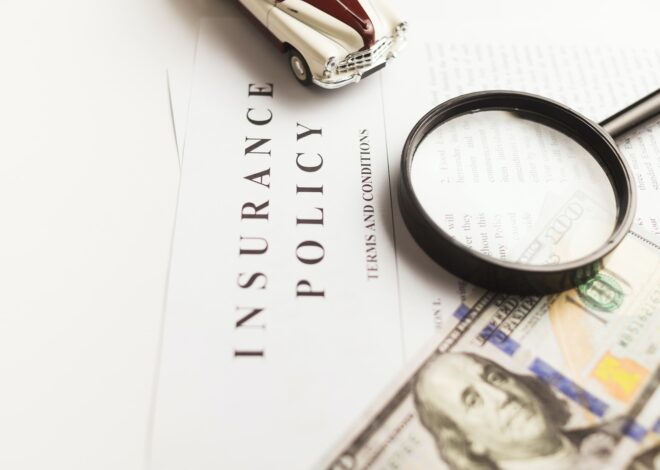
Homeowner’s Insurance: Protecting Your Investment
Introduction to Homeowner’s Insurance
Homeowner’s insurance is a form of property insurance that covers losses and damages to an individual’s house and assets in the home. It provides liability coverage against accidents in the home or on the property.
The Purpose of Homeowner’s Insurance
The primary purpose of homeowner’s insurance is to provide financial protection against disasters. A standard policy insures the home itself and the things you keep in it. It is a package policy, which means it covers both damage to your property and your liability or legal responsibility for any injuries and property damage you or members of your family cause to other people.
Why It’s Important
Homeowner’s insurance is crucial for anyone who owns a home. It’s your financial defense against unexpected disasters or accidents that can occur. Without it, you would have to pay out of pocket for any damages or legal disputes that arise.
What’s Next?
In the following sections, we will delve deeper into the basics of homeowner’s insurance, the types of coverage it offers, its importance in protecting your investment, how to choose the right policy, and common misconceptions about homeowner’s insurance.

Understanding the Basics of Homeowner’s Insurance
Homeowner’s insurance is a type of property insurance that covers losses and damages to an individual’s house and to assets in the home. It also provides liability coverage against accidents in the home or on the property.
Components of a Homeowner’s Insurance Policy
A typical homeowner’s insurance policy has several key components:
- Dwelling Coverage: This is the part of your policy that helps pay to repair or rebuild your home if damage is the result of a covered loss. Critical home components like plumbing, electrical wiring, heating, and permanently installed air conditioning systems are also usually covered.
- Other Structures Coverage: This includes coverage for detached structures, like garages, sheds, and fences on your property.
- Personal Property Coverage: This can help pay to replace your belongings which are stolen or damaged by a covered loss.
- Liability Coverage: If someone gets injured on your property, or you damage someone else’s property, liability can help cover the legal fees and other related costs.
- Additional Living Expenses (ALE): If your home is being repaired or rebuilt due to a covered claim, this coverage can help with temporary housing and other additional living expenses.
Understanding Policy Exclusions
It’s important to understand that not all types of damage are covered by a standard homeowner’s insurance policy. For example, damage caused by earthquakes and floods are typically not covered by homeowner’s insurance. You may need to buy separate insurance policies to help protect your home and belongings against those types of risks.
Deductibles and Policy Limits
A homeowner’s insurance deductible is the amount you’ll pay out of pocket toward a covered claim. The policy limit is the maximum amount your policy will pay for a covered loss. You typically choose your deductible amount and policy limits when you buy homeowners insurance.
Understanding these basics can help you effectively use your homeowner’s insurance and ensure that your home is adequately protected. In the next section, we’ll delve deeper into the types of coverage provided by homeowner’s insurance.

Types of Coverage: What Does Homeowner’s Insurance Cover?
Homeowner’s insurance provides a range of coverages to protect your home, your belongings, and your personal liability. Here’s a closer look at what’s typically covered:
Dwelling Coverage
This is the core of any homeowner’s insurance policy. Dwelling coverage pays to repair or rebuild your home if it’s damaged or destroyed by a covered peril such as fire, hurricane, hail, lightning, or other disasters listed in your policy.
Other Structures Coverage
This part of your policy covers structures on your property that are not attached to your home. For example, detached garages, tool sheds, and fences are typically covered under this portion of your policy.
Personal Property Coverage
Personal property coverage reimburses you for the personal items in your home that may be damaged or destroyed by a covered cause of loss. This could include your furniture, clothes, sporting goods, and electronics.
Liability Protection
Liability coverage protects you if you, your family members, or your pets cause damage to other people or their property. It pays for both the cost of litigation and any court awards, up to the limit of your policy.
Additional Living Expenses (ALE)
If a covered disaster forces you out of your home, ALE covers the costs of living away from home. It covers hotel bills, restaurant meals, and other costs, over and above your usual living expenses, incurred while your home is being rebuilt.
Remember, homeowner’s insurance policies differ by which losses are covered, which coverages you choose, and what type of residence you own. It’s important to understand the details of your specific policy. In the next section, we’ll discuss the importance of homeowner’s insurance in protecting your investment.
The Importance of Homeowner’s Insurance in Protecting Your Investment
Homeowner’s insurance is a crucial part of protecting your investment. Here’s why:
Financial Protection
Your home is likely one of your largest investments. Homeowner’s insurance helps protect that investment by providing financial coverage for unexpected events like fires, storms, theft, and more. Without insurance, you would have to pay out of pocket to repair or replace your home and belongings.
Liability Coverage
Accidents happen. If someone is injured on your property, you could be held financially responsible. Liability coverage in your homeowner’s insurance policy helps protect you in these situations by covering legal fees and medical bills.
Lender Requirements
If you have a mortgage on your home, your lender will most likely require you to have homeowner’s insurance. This protects their investment in your property.
Peace of Mind
Beyond the financial protection, homeowner’s insurance also provides peace of mind. Knowing that you’re covered in case of disaster can help reduce stress and allow you to enjoy your home more fully.
In the next section, we’ll discuss how to choose the right homeowner’s insurance policy for your needs.
How to Choose the Right Homeowner’s Insurance Policy
Choosing the right homeowner’s insurance policy can be a daunting task, especially for first-time homeowners. However, by understanding your needs and comparing different policies, you can find the right coverage for your home. Here are some steps to guide you through the process.
Understand Your Coverage Needs
The first step in choosing the right homeowner’s insurance policy is to understand your coverage needs. This includes knowing the value of your home and its contents, as well as any additional structures on your property. You should also consider your liability coverage needs, which can protect you if someone is injured on your property.
Compare Different Insurance Providers
Once you have a clear understanding of your coverage needs, you can start comparing different insurance providers. Look at the coverage options they offer, their customer service ratings, and their financial stability. Remember, the cheapest policy may not always be the best one. It’s important to find a balance between cost and coverage.
Review the Policy Details
Before you sign up for a policy, make sure to review the details carefully. This includes the deductible, the limit of coverage, and any exclusions. Make sure the policy covers all the risks you want to be protected from, such as fire, theft, or natural disasters.
Consider Additional Coverage
Depending on where you live and the specific features of your home, you may need additional coverage. For example, if you live in a flood-prone area, you may need to purchase separate flood insurance. Similarly, if you have valuable items in your home, such as jewelry or artwork, you may need additional coverage to fully protect them.
Regularly Review and Update Your Policy
Finally, remember that your homeowner’s insurance needs may change over time. Regularly review and update your policy to ensure it continues to provide the coverage you need. This is especially important if you make significant changes to your home, such as renovations or additions.
By following these steps, you can find a homeowner’s insurance policy that provides the protection you need for your most valuable asset. Remember, the right policy can give you peace of mind knowing that your home and belongings are protected.
Common Misconceptions and FAQs About Homeowner’s Insurance
Homeowner’s insurance can be a complex topic, and it’s not uncommon for homeowners to have misconceptions or questions about their policies. Here are some common misconceptions and frequently asked questions about homeowner’s insurance.
Misconceptions
Misconception 1: Homeowner’s Insurance Covers All Damages
One common misconception is that homeowner’s insurance covers all types of damage to your home. However, standard policies often exclude certain types of damage, such as floods or earthquakes. For these, you may need to purchase additional coverage.
Misconception 2: The Market Value of Your Home Determines Your Coverage
Many homeowners believe that the market value of their home should determine their coverage amount. However, your coverage should be based on the cost to rebuild your home, which can be different from its market value.
Misconception 3: Homeowner’s Insurance Covers Personal Belongings Anywhere in the World
While it’s true that homeowner’s insurance often covers personal belongings, this coverage may be limited when the items are away from your home. Check your policy to understand the extent of this coverage.
FAQs
FAQ 1: How Much Homeowner’s Insurance Do I Need?
The amount of homeowner’s insurance you need depends on several factors, including the cost to rebuild your home, the value of your personal belongings, and your liability coverage needs.
FAQ 2: What Factors Affect My Homeowner’s Insurance Premium?
Several factors can affect your homeowner’s insurance premium, including the location of your home, its age and condition, the coverage amount, your deductible, and any additional coverage you choose.
FAQ 3: Does Homeowner’s Insurance Cover Renters?
No, homeowner’s insurance does not cover renters. If you rent your home, you should encourage your tenants to purchase renters insurance to protect their belongings.
By understanding these misconceptions and frequently asked questions, you can make more informed decisions about your homeowner’s insurance policy.









Thank you for writing this post. I like the subject too.
Good web site! I truly love how it is easy on my eyes and the data are well written. I am wondering how I could be notified whenever a new post has been made. I’ve subscribed to your RSS which must do the trick! Have a nice day!
May I request more information on the subject? All of your articles are extremely useful to me. Thank you!
Hi! I could have sworn I’ve been to this site before but after checking through some of the post I realized it’s new to me. Anyhow, I’m definitely happy I found it and I’ll be book-marking and checking back frequently!
Thanks for your fascinating article. Other thing is that mesothelioma cancer is generally a result of the breathing of material from asbestos, which is a positivelly dangerous material. It’s commonly found among employees in the structure industry who definitely have long exposure to asbestos. It can be caused by moving into asbestos insulated buildings for a long period of time, Genes plays a huge role, and some people are more vulnerable for the risk in comparison with others.